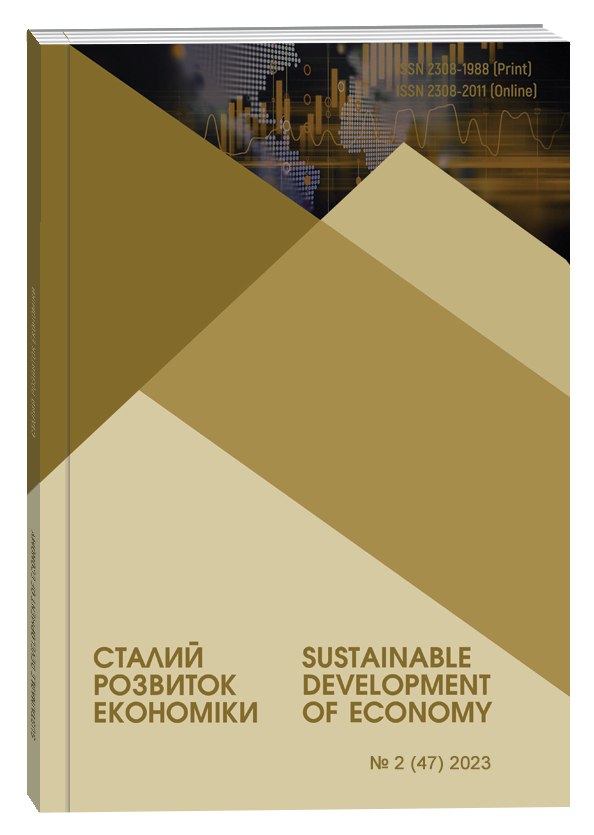RESEARCH OF THE IMPACT OF GLOBAL CRISES ON THE WORLD ECONOMY
Abstract
The study of the global financial crisis and trends in the global economic recovery remains an extremely urgent task against the backdrop of the events that followed the global financial crisis of 2008-2009 and the crisis associated with the COVID-19 pandemic. Analyzing the actions of governments and international organizations during the crisis helps to determine which measures were successful and which can be applied to improve financial and economic policy. The global economy is increasingly interconnected, and events in one country can have a global impact. Understanding trends in the global economy is important for global decisions and cooperation between countries. Modern financial instruments and markets are becoming increasingly complex and innovative. Research on financial crises helps to understand the risks associated with these instruments and how their implementation may affect financial stability. The study of the global financial crisis and global economic recovery trends is an urgent task because of their impact on the current economic reality and future opportunities for sustainable economic development. The article examines the current causes and consequences of the impact of global financial crises on the socio-economic development of countries. The main causes of financial crises and their consequences, such as deregulation of the financial sector, loss of employment opportunities, reduced demand for imports, balance of payments imbalance and reduced investment, are analyzed. The dynamics of unemployment and inflation rates, the world poverty index, the dynamics of real GDP growth in the world, the level of budget deficits and the US public debt in 2000-2022 are estimated. An approach to studying the dependence of the state budget deficit on the growth rate of real GDP using correlation and regression analysis is proposed. The results obtained can be used to understand the mechanisms of the impact of global crises on the global economy, and also provide practical implications for the development of management strategies aimed at ensuring a sustainable economic response and recovery under conditions of uncertainty.
References
Кузнецов О. Генеза фінансових криз. Вісник Національного банку України. 2010. № 11. С. 30–33.
Лазня А. Фінансова криза: причини виникнення та вплив на світову економіку. Світ фінансів. 2012. № 2. С. 54–62.
The World Bank: official web-site. URL: https://www.worldbank.org/en/home (дата звернення: 10.10.2023).
Мочерний С.В. Економічний енциклопедичний словник. Львів: Світ, 2005. Т-1. 611 с.
Кукіна Н.В., Захарченко О.Г. Державний борг як фактор ризику безпеки України: макроекономічний огляд. Збірник наукових праць Таврійського державного агротехнологічного університету (економічні науки). 2013. № 3. С. 116–122.
Вахненко Т.П. Особливості формування державного боргу та управління його складовими в період фінансової кризи. Фінанси України. 2009. № 6. С. 14–28.
Kuznetsov O. (2010) Heneza finansovykh kryz [Genesis of financial crises]. Bulletin of the National Bank of Ukraine, vol. 11, pp. 30–33. (in Ukrainian)
Laznya A. (2012) Finansova kryza: prychyny vynyknennia ta vplyv na svitovu ekonomiku [Financial crisis: causes and impact on the world economy]. World of Finance, vol, 2, pp. 54–62. (in Ukrainian)
The World Bank: official web-site. Available at: https://www.worldbank.org/en/home (accessed 10.10.2023).
Mochernyi S.V. (2005) Ekonomichnyi entsyklopedychnyi slovnyk [Economic encyclopedic dictionary]. Lviv: Svit, Т-1. 611 p. (in Ukrainian)
Kukina N.V., Zakharchenko O.G. (2013) Derzhavnyi borh yak faktor ryzyku bezpeky Ukrainy: makroekonomichnyi ohliad [Public debt as a risk factor for Ukraine's security: a macroeconomic review]. Collection of scientific works of Tavria State Agrotechnological University (economic sciences), vol. 3, pp. 116–122. (in Ukrainian)
Vakhnenko T.P. (2009) Osoblyvosti formuvannia derzhavnoho borhu ta upravlinnia yoho skladovymy v period finansovoi kryzy [Peculiarities of the formation of public debt and management of its components during the financial crisis]. Finansy Ukrainy, vol. 6, pp. 14–28. (in Ukrainian)


